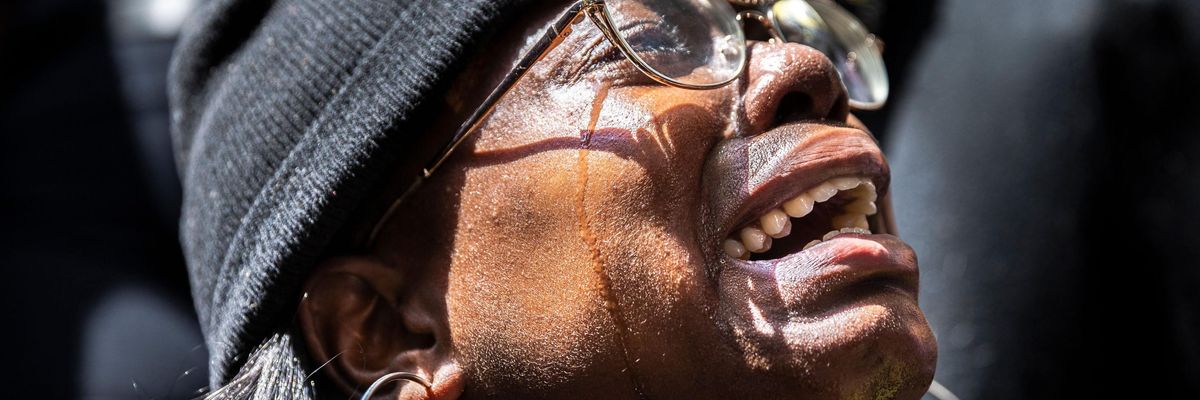The historically long, 22.5 year prison sentence handed out in Minneapolis to former cop and blithe sociopath Derek Chauvin for the "particular cruelty" of "publicly torturing a man on a bright city street" unto death was, as many noted, "one step closer to healing" for a family, community and nation scarred by the gruesome murder of George Floyd in May 2020. Hennepin County District Judge Peter Cahill said he was adding 10 years above the presumptive minimum of 10 years to Chauvin's sentence due to "aggravating factors": abuse of a position of trust and authority as a police officer, commission of a crime in the presence of children, commission of a crime as part of a group with three other cops, and the infamous, stomach-churning "particular cruelty" of slowly choking a black man to death for a possible $20 crime. In a rare move during his trial, multiple police officers had testified Chauvin's use of force was "totally unnecessary" - proof, noted Assistant A.G. Matthew Frank, that his crime was "egregious...This is the time for the criminal justice system to say, 'We hear you. We recognize this harm is real.'" At the sentencing, Floyd's family tearfully, heartrendingly chronicled that reality. "I ask about him all the time," said his 7-year-old daughter Gianna on video; she recalled, "We used to have dinner every single night before I went to bed. He used to help me brush my teeth." "Our family is forever broken," testified George's nephew Brandon Williams. "You may see us cry, but the full extent of our pain and trauma will never be seen with the naked eye." "Every day I have lifted my voice for justice to be served," said George's brother Philonise, who described a year of "little sleep and constant nightmares, hearing my brother beg and plead for his life over and over again" to a thug with "a smirk on his face." That crude incognizance evidently remains intact: The guy who over 19 years of abuses racked up 17 prior complaints of often-brutal violence offered a brief, blank offer of "condolences" to the shattered family of his victim. His mother - narcissistic apple/tree - said her son was "a good man" with "a big heart," and lamented that, if he went to prison, she wouldn't be able to give him her "special hug." Because, really, who else matters in this case, she concluded, "I believe a lengthy sentence will not serve Derek well." She did not mention George Floyd.
George's family, meanwhile, made it searingly clear "we have been given a life sentence...We will never be able to get George back." Many others echoed them. "Today's sentencing is not justice," declared Minnesota A.G Keith Ellison, "but it is another moment of real accountability on the road to justice." The "rare moment of consequence" amidst a systemic racism where police still kill 1,000 people a year "does not represent justice," stressed the ACLU's Ben Feist. "Justice would mean George Floyd was still alive today with his daughter, his girlfriend, his family, and his community." Despite one verdict and one sentence, noted a weeping Jacob Blake Sr. about the pain of too many black families, "We can't find justice, man. It eludes us." In a bittersweet twist, the day of Chauvin's sentencing also marked what would have been the 19th birthday of Tamir Rice, shot dead while playing in a park at the age of 12 by cops who were never charged. "Today is your 19th birthday," proclaimed Daily Black History Facts. "You should be here." His still-grieving family held a rally in Cleveland to demand the case be re-opened. Said his mother Samaria, "I want justice for my son, period" - a dictate, argued activist Josiah Quarles, that requires "generational change. This is about radically shifting the way America deals with brown and black people." In a "haunting" illustration, the great Ta-Nehisi Coates quotes Chicago poet Eve Ewing's 1919, which cites the belief among white people that the Great Migration was "the worst calamity that had struck the city since the Great Fire of 1871" that killed hundreds and hollowed out the city. "Once a people become 'a calamity,' all means of dealing with them are acceptable," Coates writes. "To plunder a people of everything, you must plunder their humanity first." "And so it is, with the children of the enslaved, to this very day," he notes: George Floyd's murder suggests "the belief in black people as disaster, as calamity, as a Great Fire upon the city, has not yet waned...A man invents a monster to justify his brutality, only to find the monster is within." For the first, hopeful time in history, Coates sees the possible emergence of "a legitimate anti-racist majority." Still, he knows full well "we can never depend on it." Floyd, Rice, Grant, Till, all that came before: "We are enrolled in the longest war, ancestral, generational."

